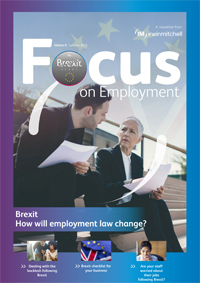Institute of Directors predicts that Brexit
will cause widespread hiring freeze
A snap poll by the Institute of Directors
(IoD) has found a quarter of companies
will impose a hiring freeze after the UK’s
decision to leave the EU. It surveyed 1,000 of
its members, revealing that one-third would
keep hiring at the same pace, and 5% would
cut jobs. One in five are considering moving
some of their operations outside of the UK.
Presenteeism - not such a bad thing?
A report by the Institute for Employment Studies has challenged the idea that workers
have to be 100% fit before going back to
work. It argues that returning to work can
have a beneficial effect on rehabilitation and
recovery, even for workers with more serious
health conditions.
Court of Appeal to hear holiday pay case
The on-going saga of whether commission
should be included in holiday pay, in the case
of Lock v British Gas, has been heard by the
Court of Appeal.
Despite an ECJ judgment in favour or Mr
Lock, British Gas is seeking to argue that
UK legislation cannot be interpreted to give
effect to EU law.
The outcome of the case will be reported in
the autumn edition of Focus on Employment.
Toolkit helps to manage older workers
An interactive resource developed by Age Action Alliance has launched a toolkit to help
employers manage older workers. It includes
information relating to retaining, retraining
and recruiting older workers and also provides
legal advice on flexible working applications.
Review of tribunal fees says they are too
high
The House of Commons Justice Committee
has published its review into court and tribunal fees. It suggests that Employment
Tribunal fees should be “substantially
reduced”. The Ministry of Justice has
conducted a separate review and findings will
be released shortly.
House of Commons gathering evidence
on workplace dress rules
The House of Commons has launched an
inquiry into high heels and workplace dress
codes after a disgruntled worker collected
almost 150,000 signatures calling for a ban
on employers being able to force women to
wear heels at work.
The joint inquiry, held by the House of
Commons Petitions Committee and Women
and Equalities Committee, also includes
the wider issues of gender dress codes and
discrimination. Once all evidence has been
collated it will make recommendations to the
Government. Read more on the petition.
Banning Muslim headscarf justified
The Advocate General has given an opinion
that a Belgian company’s dress code
banning employees from wearing any
visible religious, political or philosophical
symbols in the workplace, which was used
to prevent a Muslim employee from wearing
an Islamic headscarf, did not amount to
direct discrimination. The ban affected
all employees equally; it was not based on
stereotypes or prejudice against one or more
particular religions or against religious beliefs
in general. The European Court of Justice
will determine the issue in due course.
Court finds UK gangmaster liable for
modern slavery victims
A British company has been found liable for
six victims of modern slavery it engaged to
catch chickens. The judge ruled that the men
were owed compensation for the company’s
failure to pay the agricultural minimum wage,
for the charging of prohibited work-finding
fees, for unlawfully withholding wages, and
for depriving the workers of facilities to wash,
rest, eat and drink.
The amount of compensation will be
assessed at a future date but is expected
to run to hundreds of thousands of pounds
for unpaid wages. Read more details in The Guardian.
Crackdown on legal highs
The fate of so-called legal highs has taken a
new turn. The Psychoactive Substances Act is
now in force, making it an offence to make,
supply, offer to supply, import or export any
of these substances where they are intended
for human consumption.
The legal highs include stimulants, ‘downers’,
or hallucinogens. They are dangerous and
while the use of some may be less easy to
spot than others, employers are advised
to keep a close eye on workers’ changing
behavioural patterns. ACAS has provided useful information on the matter.
Summer 2016
Download Summer 2016 issue (pdf)
For general enquiries
0808 291 3524
Or we can call you back at a time of your choice
Our opening hours are Monday to Friday 8am to 6pm (excluding Public Holidays).
